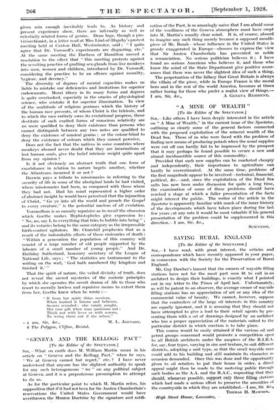"GENEVA AND THE KELLOGG PACT"
[To the Editor of the SPECTATOR.] SIR,—What on earth does M. William Martin mean in his article on Geneva and the Kellogg Pact," when he says, “ We at Geneva cannot but regret," etc. ? I have never understood that anyone has the slightest authority to speak for any such heterogeneous " we " on any political subject at Geneva, and it is a preposterous presumption to attempt to do so.
As for the particular point to which M. Martin refers, his supposition that if it had not been for Sir Austen Chamberlain's reservations the United States Government would have overthrown the Monroe Doctrine by the signature and ratifi-
cation of the Pact, is so amazingly naive that I am afraid some of the woolliness of the Geneva atmosphere must have crept into M. Martin's usually clear mind. It is, of course, absurd to imagine any such thing merely because a supposed mouth- piece of Mr. Borah—whose influence in the United States is grossly exaggerated in Europe—chooses to express the view that Sir Austen Chamberlain has prevented so noble a renunciation. No serious politician believes it ; I have found no serious American who believes it, and those who know the mind of the State Department give positive assur- ances that there was never the slightest idea of such a thing.
The perpetuation of the fallacy that Great Britain is always the villain of the piece, while in Europe France is the moral hero and in the rest of the world America, becomes at times rather boring for those who prefer a realist view of things.—






























 Previous page
Previous page